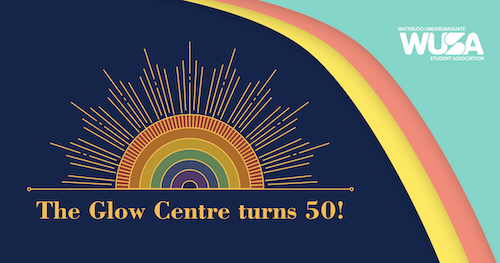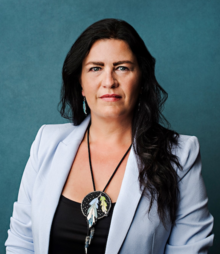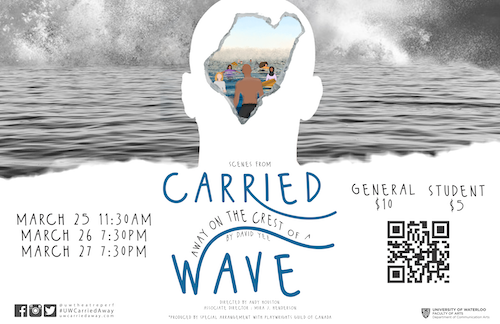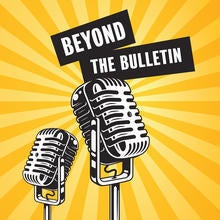The Daily Bulletin is published by Internal and Leadership Communications, part of University Communications
Contact us at bulletin@uwaterloo.ca
Submission guidelines
Editor:
Brandon Sweet
University Communications
bulletin@uwaterloo.ca

The University of Waterloo has a number of experts available for comment on various aspects of the COVID-19 pandemic.
 The AstraZeneca vaccine has recently been approved in Canada and is evaluated to be about 62 per cent effective in preventing the COVID-19 virus.
The AstraZeneca vaccine has recently been approved in Canada and is evaluated to be about 62 per cent effective in preventing the COVID-19 virus.
Kelly Grindrod, a pharmacist and professor, breaks down how this vaccine and others like it work.
Viral vector vaccines use a safe virus to deliver information about the virus you want to vaccinate against. The AstraZeneca vaccine uses a chimpanzee cold virus that contains genetic information about the COVID-19 spike protein. The chimpanzee cold virus is used because it can’t make people sick, but also because people haven’t been exposed to it before and wouldn’t have antibodies against it.
If you recall for mRNA vaccines, the mRNA gives your body information on how to build the spike protein. Viral vector vaccines are similar but they hide the instructions for the spike protein in a safe virus. The Johnson & Johnson vaccine also uses a safe virus—they use a human adenovirus (cold virus) that is modified so it can’t replicate and make you sick.
Viruses use your own cells to make more viruses. That’s how they spread. With viral vector vaccines, the safe virus particle infects your cell just like how a cold virus does. However, the viral vector vaccine is modified so it doesn’t spread. Instead, it just delivers genetic instructions for your cell to build COVID-19’s spike proteins. Your cell displays the spike protein and your immune system sees it and memorizes it. Your body then gets rid of the cell with the spike protein and also gets rid of the safe virus particle that delivered the instructions. The viral vector vaccine does not change your DNA or your genetic information. It just gives your body a memory to help it recognize COVID-19 in the future.
This is the big question on everyone’s mind. In studies, the viral vector vaccines were very effective at reducing severe symptoms of COVID-19, hospitalization and death. These are by far the most important outcomes for a vaccine during this pandemic, and they appear to be 100 per cent effective for severe disease consistently across the viral vector COVID-19 vaccines and trials. The real goal of the COVID-19 vaccine right now is to take the pressure off of the hospitals so we can start re-opening the economy, and these vaccines do that very well.
They are closer to 60 per cent effective for preventing illness altogether. This means you may still get mild cold symptoms, but the vaccine would keep you out of hospital. The research in people over age 65 was also limited, so, for the time being, the guidance in Canada is to use these vaccines in people aged 18-65. As a result, the approval of the AstraZeneca vaccine means that people under age 65 could be vaccinated earlier, while we use the Pfizer and Moderna vaccines for people over age 65.
In a word, no. If you are eligible for a viral vector vaccine and you are offered one, the best strategy is to get vaccinated as early as possible. This is a common question, but it is also a bit of a false choice. For healthy people under age 65, the choice wouldn’t be between AstraZeneca’s vaccine and Pfizer’s vaccine. It would be choosing between being vaccinated now in what may be the start of a third wave, versus being unvaccinated until there is enough vaccine for you—likely in the summer months.
Right now, there is also research underway to examine the efficacy of giving an mRNA (Pfizer, Moderna) booster to people who got a viral vector vaccine (AstraZeneca, Johnson and Johnson). Similarly, there are ongoing efforts to include the new variants in future doses of the vaccines possibly as a booster for those vaccinated now.
The United Kingdom has vaccinated over 15 million people over the age of 18 with the AstraZeneca vaccine. They are starting to see reductions in infection rates and hospitalizations—even though their dominant strain is a variant of concern. In fact, the data from the UK was one of the most compelling reasons to approve this vaccine for Canadians. There is also an approved viral vector vaccine for Ebola, and viral vector vaccines being studied for HIV and Zika. Russia’s Sputnik V vaccine is also a viral vector vaccine.

A message from the Waterloo Undergraduate Student Association (WUSA).
This March 8, the Glow Centre will celebrate its 50th Anniversary. Glow is the oldest continuously-running university-based LGBTQ+ group in Canada. Operated by the Waterloo Undergraduate Student Association (WUSA), the service was established in 1971 to create a space for members of the queer community to feel included and safe at the University of Waterloo. The Glow Centre is run entirely by dedicated student volunteers.
This service promotes a healthy attitude towards all sexual orientations and gender identities on the University of Waterloo campus by providing a wide variety of peer support, social events and resources for students. It also works to advocate for the LGBTQ+ community and towards further equity for these folks on campus.
On this 50th anniversary of Glow, WUSA acknowledges the hard work and commitment that birthed this achievement and is very proud of Glow and the many milestones it has achieved. Join us in celebrating the Glow Centre by acknowledging its accomplishments with a party! Everyone is invited to celebrate this occasion with Glow via Zoom, on March 8, 2021, at 7 p.m. EST. For more details on the event and to register, check out Glow’s 50th Anniversary event on Ticketfi.
We are so proud of the work this service and its dedicated student volunteers have accomplished. For more information about Glow, check out the Glow Centre for Sexual and Gender Diversity page.
A message from the Indigenous Initiatives Office.
 On February 26, the University of Regina announced the appointment of Lori Campbell as Associate Vice-President, Indigenous Engagement effective June 1, 2021. Lori Campbell currently serves as Director of the Waterloo Indigenous Student Centre at St. Paul’s University College, a role she began January 2017, and is also an adjunct lecturer for the Indigenous Studies program. In January 2018, Lori accepted a half-time secondment as Director, Indigenous Initiatives with the Human Rights, Equity and Inclusion office for six months. During this time Lori helped initiate the Indigenization strategy for the University of Waterloo.
On February 26, the University of Regina announced the appointment of Lori Campbell as Associate Vice-President, Indigenous Engagement effective June 1, 2021. Lori Campbell currently serves as Director of the Waterloo Indigenous Student Centre at St. Paul’s University College, a role she began January 2017, and is also an adjunct lecturer for the Indigenous Studies program. In January 2018, Lori accepted a half-time secondment as Director, Indigenous Initiatives with the Human Rights, Equity and Inclusion office for six months. During this time Lori helped initiate the Indigenization strategy for the University of Waterloo.
Since her arrival to the Waterloo Region in 2017, Lori has been an active community member, including running as an NDP candidate in the 2019 election. The Indigenous Initiatives Office would like to recognize and thank Lori for assisting with the foundational work of the 2018 Indigenization Strategy and for her work with Indigenous students over the years. Congratulations Lori on your appointment at the University of Regina. We wish you all the best in your new role.

A message from the Theatre and Performance program.
The Theatre and Performance program has announced its production for the winter term. This term's production is scenes from carried away on the crest of a wave by David Yee. Nine senior undergraduates from the Theatre and Performance program make up the core of the creative team.
carried away on the crest of a wave is a series of stories that follow the impacts of the 2004 Indian Ocean tsunami as they resonate, intersect globally, and move us with the power of water and the beauty of human resilience. The deadliest tsunami in recorded history, the waves killed over 250,000 people from forty-six countries as they struck the coasts of fourteen nations spanning two continents. In the aftermath, we find a wide range of humanity: a conflicted priest, sisters of legend, an orphaned boy, a radio shock jock, an awed scientist, and a man who makes miraculous discoveries in the aftermath of the disaster.
The audience bears witness to the experiences of people from around the world who have been changed in their minds and souls by this event. These stories represent glimpses of the human spirit, facing enormous adversity yet driven by a will to come together for reflection and sharing — a desire that our own pandemic-impacted world knows all too well. The staging of scenes from carried away on the crest of a wave will reveal the effects of a global natural disaster through a surreal lens. In the ebb and flow of trauma, the unconscious and perceptual space of dreams will exist alongside and within our experience and understanding of reality.
Director Andy Houston collaborates with Denyse Karn (set and props), Howard J. Davis (projections), and Deanna Choi (sound), as well as resident designers Nadine Grant (costume) and Nicole Reid (lighting). Together, they weave together a dream-like world of found objects, images, and people amidst an environment as fluid as floodwaters from a tsunami.
As the program’s first-ever livestreamed production, carried away on the crest of a wave aims to connect our communities in times of uncertainty through the medium of live theatrical performance. There will be a digital dramaturgy Hub and Engagement Space hosted on the website for the performance, which can be found at uwcarriedaway.com. This space aims to provide context to our audience’s experience of the play and production, from research sources and themes of the work to the creative vision of the artistic team. Don’t miss this important aspect of scenes from carried away on the crest of a wave.
The production runs from March 25 to 27, with an afternoon matinee performance at 11:30 a.m. on March 25 and performances at 7:30 p.m. on March 26 and 27. All performances will be livestreamed. Tickets are available on the Theatre and Performance department's website.
Education Technologies Week is wrapping up today with a pair of seminars:
CTE’s annual Educational Technologies Week is an annual opportunity for Waterloo’s instructors to focus more intensively on teaching development and technologies for promoting deep learning.
Here's the latest Nutrition Month Myth vs. Fact supplied by Health Services Dietitian Sandra Ace:
Myth:
Leftovers can be stored in the refrigerator for a week.
Fact:
Most leftover food should be used within two to four days.
More people are preparing home-cooked meals over the past year, and this likely means that many refrigerators are well-stocked with leftovers. Using leftovers saves time and decreases both food waste and grocery costs. However, since leftovers can be a source of foodborne illness, it is important to know how to handle them safely.
In spite of what you’ve probably heard, it’s fine to refrigerate prepared food while it’s still warm. Very hot items can be cooled briefly until they stop steaming. Food left on the counter is easy to forget about and any perishable food left at room temperature more than two hours should be discarded. Transfer your leftovers into smaller, shallow containers where they will cool more quickly and refrigerate them promptly. You can leave the container lid off or ajar a bit until the food has cooled to refrigerator temperature and then cover it tightly.
Date your leftovers so you can keep track of how old they are and use this chart to determine how long you can safely store them. If you aren’t sure how old something is, don’t rely on the “sniff test” as spoiled food doesn’t necessarily have a bad smell. Reheat leftovers to an internal temperature of 74ºC (165ºF) and use a digital thermometer to check this. Gravies, soups and sauces should be brought to a full, rolling boil. Throw away any uneaten leftovers once they have been reheated.

The latest episode of the Beyond the Bulletin podcast is now live. Every day during the pandemic, we receive sad statistics about the number of people sick with COVID-19 or who died, as well as details about the effect on the economy and our daily lives. We can feel grief when someone we love dies, or at other times of loss. Professor Susan Cadell, from the School of Social Work, tells us ways to recognize feelings of grief in ourselves and others and what can help. Dominic Barton, an internationally recognized business strategist, will serve another term as Waterloo’s chancellor. The main clinic at the School of Optometry and Vision Science delivers COVID-19 Panbio rapid antigen tests. The Glow Centre for Sexual and Gender Diversity’s 50th anniversary and the International Women’s Day Breakfast are next week.
The podcast will be on hiatus next week, returning March 19.
Students can visit the Student Success Office online for supports including academic development, international student resources, leadership development, exchange and study abroad, and opportunities to get involved.
Instructors can visit the Keep Learning website to get support on adapting their teaching and learning plans for an online environment.
Updated Course templates are now available within your course in LEARN to help you build and edit your content and assignment pages quickly. Support for Winter 2021 is available.
The following workshops, webinars, and events are offered by the KL team (CTE, CEL, ITMS, LIB):
Independent Remote Course Design Essentials. Self-directed, continuous self-enrollment course in LEARN.
Introduction to Assessments in PebblePad (ATLAS) (CTE7512), Monday, March 8, 2:00 p.m. to 4:00 p.m.
Employees can access resources to help them work remotely, including managing University records and privacy of personal information. Here are some tips for staying healthy while working from home.
Stay informed about COVID cases on campus by consulting the COVID case tracker.
Whether you’re a student or faculty member, the Writing and Communication Centre has virtual services and programs to help you with all of your academic writing needs. This term we have added evening and weekend one-to-one appointments with our peer tutors, and our NEW one-to-one workshops, where you can learn the content directly from one of our writing advisors.
Co-op students can get help finding a job and find supports to successfully work remotely, develop new skills, access wellness and career information, and contact a co-op or career advisor.
The Centre for Career Action assists undergraduates, graduate students, postdocs, staff, faculty, and alumni through navigating career services that are right for them. You can attend a one-on-one appointment or same day drop-in session at the CCA for assistance with cover letter writing, career planning and much more. You can also book an appointment online or visit our Live Chat to connect with our Client Support Team. The CCA is here to help you.
If you feel overwhelmed or anxious and need to talk to somebody, please contact the University’s Campus Wellness services, either Health Services or Counselling Services. You can also contact the University's Centre for Mental Health Research and Treatment. Good2Talk is a post-secondary student helpline available to all students.
The Library has published a resource guide on how to avoid information overload.
The Faculty Association of the University of Waterloo (FAUW) continues to advocate for its members. Check out the FAUW blog for more information.
The University of Waterloo Staff Association (UWSA) continues to advocate for its members. Check out the UWSA blog for more information.
The Indigenous Initiatives Office is a central hub that provides guidance, support, and resources to all Indigenous and non-Indigenous campus community members and oversees the university Indigenization strategy.
The Waterloo Indigenous Student Centre, based at St. Paul’s University College, provides support and resources for Indigenous students, and educational outreach programs for the broader community, including lectures, and events.
WUSA supports for students:
Peer support (Visit https://wusa.ca/peersupport to book an appointment):
Bike Centre – Will be reopening soon.
Campus Response Team, ICSN, Off Campus Community and Co-op Connection all available online. Check https://wusa.ca for details.
Food Support Service food hampers are currently available from the Turnkey Desk on weekdays from 7:30 a.m. to 7:00 p.m. in the Student Life Centre. If you have any questions please email us at foodsupport@wusa.ca.
Centre for Academic Policy Support - CAPS is here to assist Waterloo undergraduates throughout their experience in navigating academic policy in the instances of filing petitions, grievances and appeals. Please contact them at caps@wusa.ca. More information is available.
WUSA Commissioners who can help in a variety of areas that students may be experiencing during this time:
WUSA Student Legal Protection Program - Seeking legal counsel can be intimidating, especially if it’s your first time facing a legal issue. The legal assistance helpline provides quick access to legal advice in any area of law, including criminal. Just call 1-833-202-4571.
Empower Me is a confidential mental health and wellness service that connects students with qualified counsellors 24/7. They can be reached at 1-833-628-5589.
Healthy Warriors at Home. Free programming including Online Fitness, Health Webinars, Personalized Nutrition and more from Warriors Athletics and Rec. Open to students, staff, faculty and alumni. Register today.
Livestream Exercises for Waterloo staff: Join us for an energy boosting Bootcamp or a fast and effective Express Home Workout! Open to UW Staff and subsidized by the Staff Excellence Fund.
Renison English Language Institute continues to offer virtual events and workshops to help students practice their English language skills.
Warriors vs. Laurier Blood Donation Battle. Join your fellow Warriors, donate blood and help us win the Blood Battle against Laurier for a second year in a row. Set up a profile or add the PFL code: UNIV960995 to your account if you have a blood.ca account already. Questions? Contact WarriorsInfo@uwaterloo.ca.
Warrior Rec Free Programs for Students, January to February. Wide range of free opportunities available to keep students active and healthy including:Fitness Classes (On-Demand), Health and Mindfulness Webinars, Personalized Nutrition Guides, Personal Training Consultations, Small Group Training and Warrior Reset. Register today.
Drop-in to Warrior Virtual Study Halls on Wednesdays from 5:30 p.m. to 7:00 p.m. Come together in this virtual space to set goals and work independently or in groups each week.
Virtual Writing Café, Friday, March 5, 9:00 a.m.
IT Seminar: Move to O365 SharePoint Online Project, Friday, March 5, 9:00 a.m. to 9:45 a.m. Join online
Master of Taxation Virtual Information Session, Friday, March 5, 9:00 a.m. to 10:00 a.m. To register visit www.mtax.ca.
Global Spark Thought Leader Panel: Innovation in Global Health, Saturday, March 6, 11:00 a.m.
International Women's Day Virtual Breakfast, Monday, March 8, 8:30 a.m.
Glow Centre for Sexual and Gender Diversity 50th anniversary celebration, Monday, March 8, 7:00 p.m.
NEW - FAUW service opportunities, Tuesday, March 9, 1:30 p.m. to 2:30 p.m.
NEW - Noon Hour Concert: To tell a love story, Wednesday, March 10, 12:30 p.m.
NEW - Concept $5K Semi-Finals - Night 1, Wednesday, March 10, 5:00 p.m., virtual event
NEW - Concept $5K Semi-Finals - Night 2, Thursday, March 11, 5:00 p.m., virtual event
The Daily Bulletin is published by Internal and Leadership Communications, part of University Communications
Contact us at bulletin@uwaterloo.ca
Submission guidelines
The University of Waterloo acknowledges that much of our work takes place on the traditional territory of the Neutral, Anishinaabeg, and Haudenosaunee peoples. Our main campus is situated on the Haldimand Tract, the land granted to the Six Nations that includes six miles on each side of the Grand River. Our active work toward reconciliation takes place across our campuses through research, learning, teaching, and community building, and is co-ordinated within the Office of Indigenous Relations.